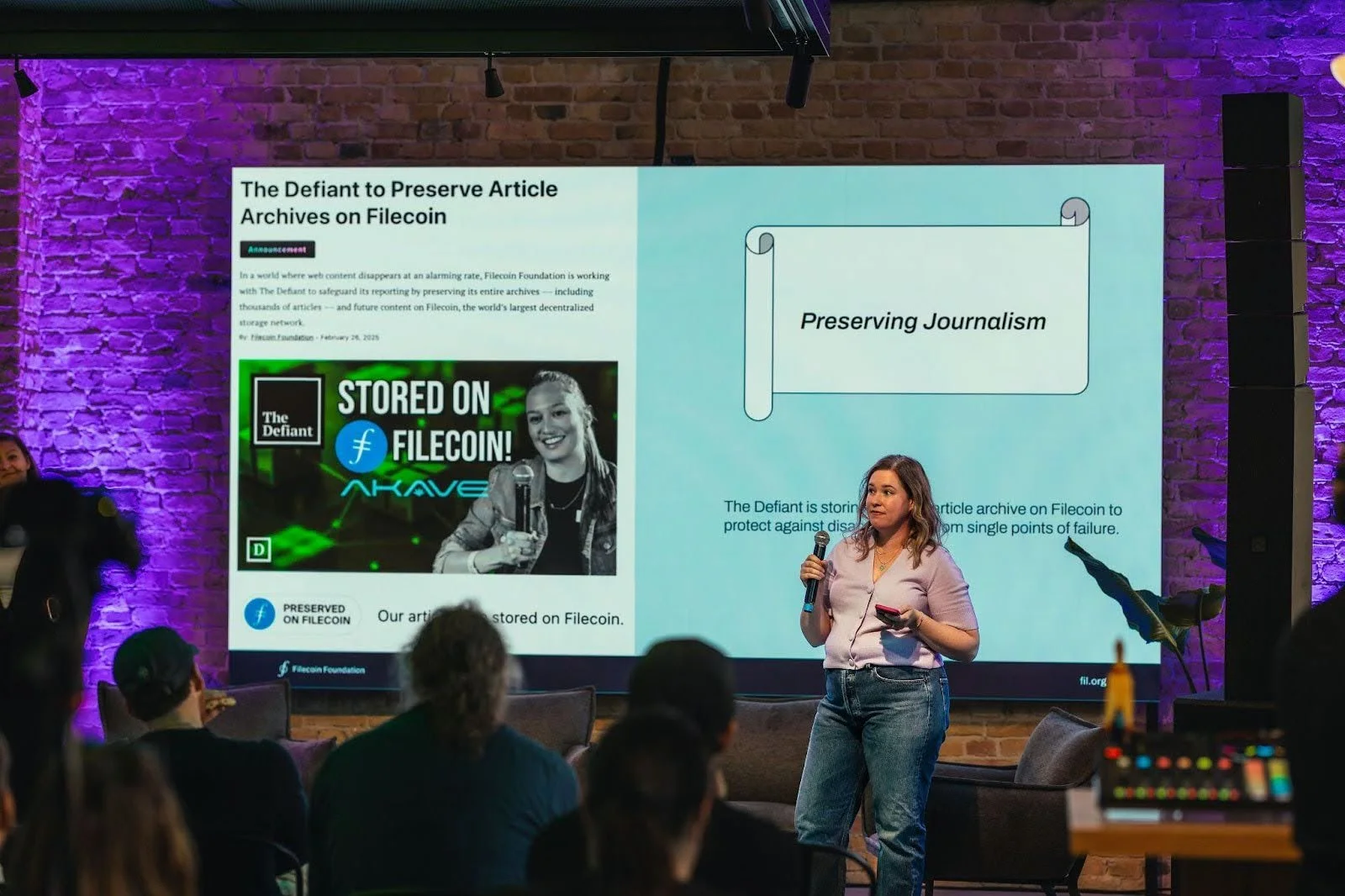Berlin Decentralized Media Summit, June 2025
The Berlin Decentralized Media event was held over two days at two different venues with Friday night's session hosted by Publix, a centre for journalism in Berlin, while Saturday morning was in the Berlin "Web3 Hub" space, thanks to Bitvavo.
On Friday MC and co-organizer Arikia Millikan introduced the event, the topic (she has been working in the space for a number of years), and keynote speaker Christine Mohan, whose CV ranges across names such as decentralized journalism startup Civil, the New York Times and the Wall Street Journal. She talked about the need for decentralization before journalism is hollowed out by a combination of budget constraints and the replacement of real investigation by increasingly syndicated content produced with little regard to its value as information for readers, the priority being to drive engagement with platforms at low cost.
The theme was expanded in a panel, where she was joined by Sonia Peteranderl and Wafaa Albadry, along with the airing of concerns regarding trustworthiness of content, the persistence of information, and increasing censorship. Setting the stage for the next day's discussion might have left the audience feeling bleak, but along with the panelists' own work, Olas' Ciaran Murray, and Filecoin's Jordan Fahle talked to us about some of the decentralized storage tools and techniques that are available to help address these issues.
The dinner was well set up for ongoing conversations, with some prompting from Miho and Paul on a range of relevant topics. Conversations inside and outside in Publix' garden and passionate discussions were visibly appreciated by the participants. Themes covered the gamut of issues introduced, as the open-ended and informal setting sowed the seeds of ongoing collaboration over a plate and a drink.
Saturday was a more substantial set of talks, panels, and sponsor presentations, addressing in turn various aspects in more depth. After being welcomed and introduced to the Web3 Hub, Filecoin's Jordan Fahle talked about how fast content disappears from the Web (often within a few years), and how Filecoin's content-addressing model of blockchain-backed decentralized storage can help not only keep content around, but help identify its provenance - a key need for quality journalism.
The day's first panel was presented by Arkadiy Kukarin of Internet Archive, River Davis of Titan, and Alex Fischer of Permaweb Journal, exploring preservation: how to ensure information doesn’t disappear from the Web, in a modern-day equivalent of burning of the library of Alexandria all too common a decision about ongoing payment for centralized cloud-based storage. The discussion revolved around censorship-resistance as well as the simple ability to protect information long-term that is a direct consequence of well-designed decentralisation protocols, but also the place of metadata in enabling persistence in a decentralized environment and the tradeoffs required because storage isn't in some magical cloud but is always in the end on physical devices in real places.
Security expert Kirill Pimenov then discussed messaging applications and their security properties, dissecting the landscape and the depressing reality of common communication systems. As well as high-quality platforms like Matrix and SimpleX, he also noted the need to consider reality - there possibly isn't so much need for concern about someone finding out what you asked your friends to bring to dinner, and it is important to be able to communicate, even if you have to think about how to do so knowing you have low security.
Christine Mohan moderated the next panel, with Liam Kelly of DL News, Journalist and AI specialist Wafaa Albadry, and Justin Shenk of the Open History project. The panel considered issues and changes that come with increasing use of AI tools in journalism. The issues ranged from the ethical use of deepfakes to protect sources to the impact on trust and engagement of AI in the newsroom, but the speakers also noted the crucial role of people and their own skills.
Among presentations describing solutions, Ciaran Murray presented how Olas uses decentralized technology to support better recognition of quality, and matching value flows.
A talk from Electronic Freedom Frontier's Jillian York, along with artist Mathana, explored the issues of censorship in more detail, looking at how media have portrayed, or censored, various issues over many decades. From so-called 1960s counter-culture to contemporary recognition of the rights of marginalised communities today, they elaborated on how decentralization has played an important role enabling the breadth of perspectives to be available and represented, as a bulwark against tendencies to repression of differences, and totalitarianism directing the people instead of the democratic ideal of the inverse situation.
Arikia presented the work of Ctrl+X to decentralise publishing and enable journalists in particular to own and continue to monetize their work, and Matt Tavares of Protocol Labs gave a talk motivated by the collaborative use of OSINT (he has an intelligence background - for the rest of us, that means "data that is available"), and how it isn't properly credited and remunerated over its lifetime, but crucially, should and could be.
A final panel of Matt Tavares, Arikia Millikan and Ciaran Murray considered the tension between privacy and transparency. With the obvious recognition that the topic isn't constrained to the world of Decentralized Media, but one where the needs and rights of the public to access important information particularly where it touches on the powerful interests that seek to regulate, moderate, or benefit from our behaviour, have to be balanced against the ability of individuals to exercise their rights through a basic assumption of privacy.
With that and the thanks for the many people who worked to put it together including the sponsors, the day formally wrapped up. However, once more the conversations continued, spilling into the surrounding spaces, outside, and further. We look forward to the next edition to continue our support for the development of decentralized media, one of the multiple fields where innovative adoptions of Decentralized Storage are bringing concrete benefits.



